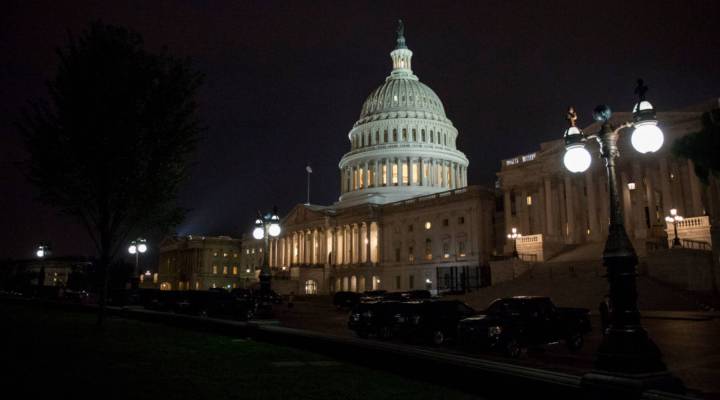
How the potential government shutdown could affect you

The House of Representatives has passed a bill to temporarily keep the government funded. But to keep it from shutting down just after midnight tonight, the Senate would have to pass its funding extension and, as you’ve been hearing, the votes may not be there.
One key issue they’re fighting over is DACA, the Deferred Action for Childhood Arrivals program. Democrats want protections for people who arrived in the U.S. as undocumented immigrant children.
Both Republicans and Democrats are already hard at it, trying to shift blame on the other party if the government indeed shuts overnight.
Jim Kessler, senior vice president for policy with the centrist think tank the Third Way, joined us to discuss which agencies will be affected and what this could mean for the GOP tax overhaul. Below is an edited transcript.
David Brancaccio: Partially shutting down the government is ugly. Government contractors may not get paid. Phone calls won’t get returned and we’ve been doing some reporting — the IRS right now is trying to figure out what to tell employers about how to configure the new pay stubs given the tax overhaul. And if the government shuts down that could delay that process.
Jim Kessler: There are certain things where people will feel no effect. You know, the air traffic controllers will go to work. The military goes to work. FBI is still working. Other things that are sort of the more routine tasks of government: They will stop. And yes, we have a new tax bill here. It’s very complicated. What gets withheld from your paycheck and what doesn’t get withheld is very hard to figure out. That is the IRS’ job. Those people will stop working on it. If you’re on vacation and you’re going to a national park or if you’re going to the Smithsonian, you’re going to find the doors locked or the gates shut. So you’ll still get your Social Security check, but signing up new people on Social Security, that’s going to be a little bit more difficult without government employees there . The longer it goes, the more the effect will feel meaningful for this country.
Brancaccio: So you work at this think tank that’s called the Third Way, and more broadly, are there strategies so that we’re not in this situation every couple of months which is the situation we seem to be in?
Kessler: Yeah, there’s a problem that’s been going on for a long time, that both parties have gotten very polarized. They are finding it very difficult to work together. This is an example of it. Except for the tax bill, which they passed completely partisan, the president hasn’t really been able to do much of anything that’s been bipartisan. He got elected actually with the promise that he was a different type of Republican that was going to reach out to both sides. He hasn’t done that. So we like parties to work together, but it’s up to the president to be a little bit more forthcoming and a little bit more flexible, I believe.
Brancaccio: All right, and most of these discussions end with a broader discussion about gerrymandering and redistricting and its connection to political polarization. But we’ll leave that for a different day.
Kessler: That’s right. Well, that’s definitely a problem.
| The cost of continuing resolutions to keep the government open adds up |
| The cost of being a DACA recipient |
| The Marketplace Guide to the Tax Bill |
There’s a lot happening in the world. Through it all, Marketplace is here for you.
You rely on Marketplace to break down the world’s events and tell you how it affects you in a fact-based, approachable way. We rely on your financial support to keep making that possible.
Your donation today powers the independent journalism that you rely on. For just $5/month, you can help sustain Marketplace so we can keep reporting on the things that matter to you.












